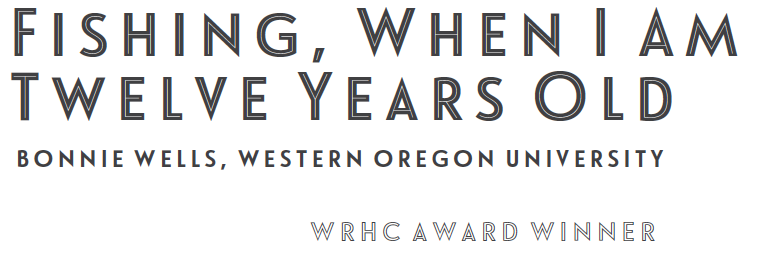*This post is part of a series of blog posts highlighting award winning contributors and supporters of Scribendi.
In her poem, Bonnie Wells describes the experience of fishing with a quiet intensity and persistent images. Readers are reminded of the inherent violence of natural processes. These images are complicated by the nostalgia of childhood memory. As this year’s WRHC Award Winner in poetry, “Fishing When I am Twelve Years Old” hooks readers into a short, but memorable journey through memory. Scribendi staff sat down (virtually) with Bonnie Wells to explore the poet, her process, and her thoughts on art.
Writing and revising are some of the most important parts of the creative process. Finding out what you want to say or what you want to show is difficult enough, but revision can be especially challenging. Bonnie shared some of her writing challenges with our interviewer.
Scribendi Staff (SS): What were some of the challenges in writing and revising this particular poem?
Bonnie Wells (BW): I had a hard time trying to get to the real heart of the experience. Trying to keep the images clear and the phrasing accurate but still fluid when I talk about the scales on the knife was also difficult. I wanted to show that I had come to a significant realization without directly telling readers what that realization was. I’m still not sure how successful I was with that.
Poetry was originally an oral art. As technology and the form of poetry evolved, other considerations, like how poems appeared on the page, became significant. Bonnie described her approach to these elements of poetry in our interview.
SS: How do you conceptualize the auditory elements of this piece? How important is it that this piece be read aloud?
BW: I think that in general I think of the auditory qualities of my poems being important, but rather secondary to how it actually looks on the page. However, this poem was shaped and refined in a poetry workshop in which I had to read it aloud many times. I think that forced me to pay attention to how the poem sounded when read aloud, and made the piece stronger in the end.
Inevitably, as with all art, we must ask ourselves the question of why. Why do we paint frescos and murals, why do we craft our words meticulously, why do we attempt to represent or create? Why is it even important? Bonnie provided a measured and thoughtful answer.
SS: Why do you think poetry is important?
BW: I think poetry is important because it is the human experience made into words. I don’t think there’s anything else that so accurately and comfortingly captures the beauty, joy, pain, boredom, horror and awe of just living.
As writers, community is useful. We ask each other, we critique each other, and we learn from each other. Bonnie shared with us some of her advice on persistence.
SS: What advice would you give to other writers and poets?
BW: Mostly just to write. Keep writing, no matter what junk life might throw at you. Also, to try to figure out when to listen to criticism and when to ignore it. It is a hard lesson to learn, but worth it to find that person or group who makes you a better writer.
Although our time together was short (and virtual) I believe that I’ve gotten a sense of our WHRC Award Winning poet, Bonnie Wells. Her character appeared humble and persistent and her craft was refined and image-driven. Here at Scribendi we were glad to have the opportunity to have a conversation with one of our award winning contributors.
